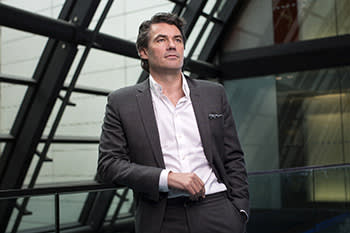A few months later, in October, a paragraph appeared halfway through BT’s announcement of its second quarter 2016 results. It said that an “initial internal investigation” at BT Italia had identified “certain historical accounting errors” and “reassessed certain areas of management judgement”. This was a balance sheet item and “the errors have not materially impacted the group’s reported earnings over the previous two years.” The errors would have no impact on the normalised free cash flow. The investigation was ongoing but it seemed containable: the write-down was expected to be about £145m, which was less than 1 per cent of BT’s balance sheet. Apart from that, it was business as usual: growth in underlying revenue was expected to continue; normalised free cash flow should be more than £3.6bn in 2017-18. All in all, BT’s outlook was unchanged.
Three months further on and, oh dear. It’s half a billion. And it’s hit profits and cash flow after all. False invoices, factoring and leasing transactions, off-balance sheet loans and that old favourite - categorising costs as capital investment - had minimised operating expenses and flattered revenues. A fraud, in other words, and it had gone on for years. This will mean about £200m less revenue and £175m less profit per year and, for 2016/17, a one-off hit of up to £500m to free cash flow, with a knock-on effect in future years.
Gavin Patterson, ceo of BT Group
There’s a common view that anyone can do a chief executive’s job, so it’s worth looking at the pressures that Gavin Patterson, BT’s chief executive, came under. First: the whistleblower was taken seriously. That was good corporate governance. Secondly, an investigation was set up, employing KPMG rather than BT’s normal auditor, PwC. Good practice, although critics have blamed BT for having relied on PwC for too many years – and PwC had failed to spot what was going on in Italy. Thirdly, the world needs to be told as soon as bad news is known. A difficult one this: reports say the BT board heard KPMG’s report on Monday 23 January and that Mr Patterson had to work through the night to make the announcement early the next day. The longer that unwelcome news is kept under wraps, the greater the risk of a leak (although there’s no suggestion that this happened at BT), so why not make it sooner? Because he wanted all the answers and full explanations needed to be checked out.
Damage limitation
Mr Patterson’s demeanour on the day was all-important too. He has been in the role for three years. It happened on his watch. He is ultimately accountable, although it has to be said that BT’s senior management and the audit committee bear a responsibility too. So it’s a difficult situation. People dread announcing profit warnings, let alone frauds. Do you apologise and eat humble pie or come out fighting? He did not mince his words: “I am very angry. This group of individuals has been basically lying for a number of years.” Then, what really motivates him - pride in his company – came out: “Everyone is tainted by it. BT’s reputation is tarnished… we’ve undermined trust in us as a management team. We have to rebuild that.” He’s sacked six senior managers. He wants to know why this fraud took so long to detect. PwC’s future with BT is in doubt. He’s asking questions of BT’s internal auditors. BT’s operations elsewhere are being checked to make sure nothing similar is happening. KPMG hasn’t finished yet.
A strong response and decisive actions are exactly the right way to draw a line under a scandal and move on. Except that, unfortunately, it is never as easy as that. In the press release, BT says that potential adjustments to prior year accounts are being evaluated. Quantifying those will imply that BT’s past financial figures have been mis-stated. This opens the door for those shareholders blessed with hindsight to claim that they bought, or held on to, BT shares under false pretences. So whilst in Milan, prosecutors are investigating allegations of false accounting and embezzlement, in New York at least two shareholder lawsuits are alleging securities fraud. Mr Patterson, Ian Livingstone (his predecessor) and Tony Chanmugam (BT’s former finance director) have all been named. In London, a similar legal wrangle is likely.
Performance divorced pay
There’s also a question over pay. Free cash flow and revenue growth helped to determine both Mr Patterson’s annual bonus of £1m in 2015-16 and the number of shares that he received, worth about £3m. His bonus also had an earnings per share target; and part of his share award depended on how BT’s total shareholder return (TSR: share price growth, including reinvested dividends) ranked against those of competitors over the previous three years. All of these performance measures will have been distorted by the Italian fraud. Had the correct figures been used, BT’s performance would have been lower. Whether this would have made a significant difference to pay is something for the remuneration committee to decide.
TSR rankings can be particularly volatile. Near enough half of the shares that Mr Patterson received in 2015-16 (worth £1.5m) was due to this measure. This part was paid out in full because BT’s TSR went up by 89 per cent between March 2013 and March 2016 and it was ranked fourth. Now suppose that most of this group of 24 TSRs were very close to each other. Just a few pence off BT’s share price could have slid it down the rankings, resulting in a much lower payout. Below 12th position and no shares would have vested at all. It is this inherent volatility in rankings that has persuaded other companies to use index-based TSRs instead.
Timing is an issue too. The 20 per cent fall in BT’s share price on 24 January presents the Remuneration Committee with another dilemma, for had the announcement been made earlier the TSR ranking might have been so low that none of these shares would have vested. And Mr Patterson would have been £1.5m worse off. This is conjecture, of course. Who knows what the share price might have done? But there is an ethical issue here. Why should senior executives be rewarded for not revealing earlier an adverse situation that ideally they should have been aware of? A recent change of policy will enable BT to claw back last year’s annual bonus payment, but this did not apply in 2013 when these share awards were made.
Of course, it could be argued that this is all swings and roundabouts. Senior executives’ bonuses will suffer this year (although not for those who have already left). Outstanding share awards are more likely to miss their performance conditions. BT also has a share ownership policy. Mr Patterson is required to own BT shares worth at least three times his salary. According to the annual report, this time last year, he owned many more than this. His shares were worth £11m so, like all BT investors, including many employees, he too has suffered a large financial hit. That should take some of the sting out of the AGM, due in July.
Crossfire
The deliberations of the remuneration committee, ironically, could be eased by something else: the fraud was not the only reason for the fall in share price. Investors were also rattled by a warning about Brexit. Back in October, the board said that, apart from the fall in sterling, the result of the EU referendum was expected to have no significant impact on BT. Now it realises that the uncertainty is delaying the renewal of contracts by multi-national corporations and the British government. Many of these contracts are not proving that profitable. This accounts for half of the feared cut to next year’s core earnings. So what of BT’s Global Services division? On paper, it makes sense to have a business dedicated to these larger organisations, but it has always struggled with low profitability. Should the division be disposed of? Mr Patterson has said that he is “not religious” about keeping it. But losing it would turn BT into a UK-only business. And as Brexit bites harder that might not be the best place to be.
The biggest challenge for all companies lies in managing risk. They get little credit for getting it right, but plenty of criticism when things go wrong. There are ongoing external threats to cyber security, for example. Products, networks and solutions need to be constantly developed and adapted to combat competitive and political pressure. In its recent trading update, BT points out that the fraud and outlook have overshadowed the good progress it is making in its other businesses. But BT also has the rearguard battle with Ofcom. Lose that, and it will be forced to split off Openreach. EE is still being integrated. Competitors claim that it has created another quasi-monopoly now that BT has an estimated 70 per cent share of the wholesale broadband market. The broadcasting rights to the European Champions League come up for auction next month; Mr Patterson says there’s a plan B in case BT is outbid. And there’s the large debt and pension fund deficit to be juggled down, which is one reason why BT’s cash flow is so important. The dividend is another.
With so many challenges, BT’s management could have done without the human and financial cost of the Italian fraud as well. Steering the group through its crossfire of challenges will be no easy task. And how the executive team is assessed and controlled will place BT’s directors under public scrutiny like never before. Now, what was that about anyone being able to do their jobs?












